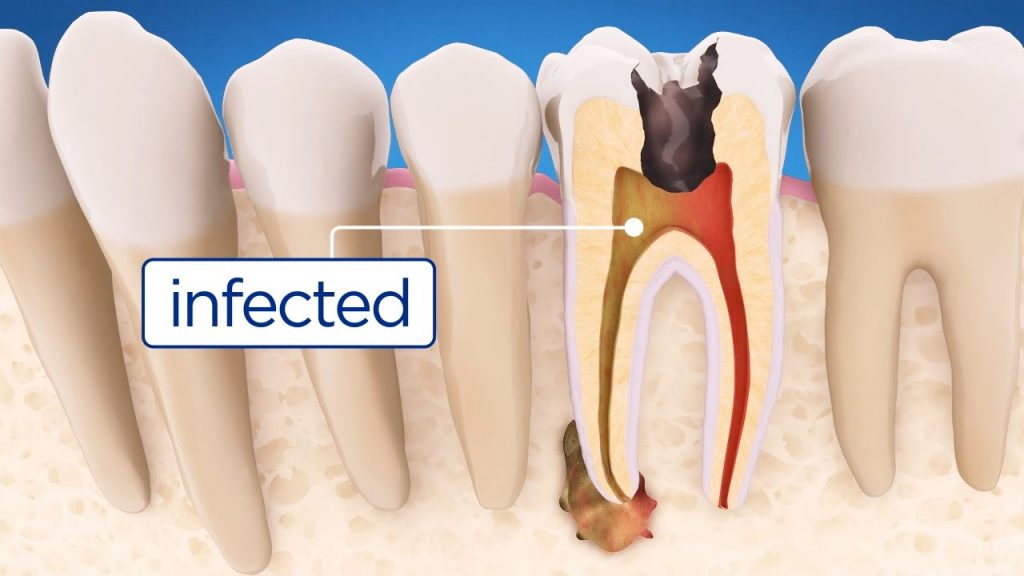Do you have a tooth that is badly infected or decayed? If yes, your endodontist or dentist may recommend a root canal treatment to save your teeth.
Root canal therapy protects and repairs infected or decayed teeth. It is performed when your dental pulp, which contains blood vessels or nerves, becomes infected. During this treatment, your dental pulp is removed and the inner parts of the tooth are sealed and cleaned.
Unfortunately, most people fear root canal treatments because they assume that it’s painful. There are a lot of misconceptions that surround the idea of the root canal. This article will provide crucial information about the root canal and when you or your friend will require this treatment.
Root canal therapy is generally recommended when the cavity reaches the innermost parts of your tooth. When the decay or infection reaches the pulp layer of your teeth, a root canal treatment becomes inevitable.

Root Canal Procedure Step By Step: What Happens During a Root Canal?
If you want to learn what happens during a root canal therapy, then you can learn more about this comfortable and quick dental procedure step by step here. According to the American Association of Endodontists, any effective root canal treatment should follow the steps outlined below:
Step 1: The dentist examines and takes an X-ray of your tooth to ascertain the nature of decay or infection. After that, he administers local anesthesia to numb your teeth and cleans your teeth thoroughly and removes all the saliva in your mouth.
Step 2: The dentist makes some openings in your dental crown using small instruments employed to clean your dental pulp.
Step 3: After space is shaped and cleaned, your dentist will fill your root canals with bio-compatible materials such as gutta-percha. He may use an adhesive cement to ensure that your root canal is sealed completely.
Step 4: After some weeks, your dentist will complete the treatment by putting a permanent crown on top of your tooth.
How Much Does a Root Canal Treatment Cost?
Despite the fear and misconceptions that people have about the root canal, some also believe that the procedure is expensive. However, the root canal treatment cost varies significantly based on various factors such location of your tooth, nature of infection or decay amongst others.
The average cost of root canal treatments ranges between $300-$1000. That said, the prices can be a bit higher for the molars than for your front teeth or bicuspids. Speak to your dentist to discuss financing options.

5 Common Signs and Symptoms of a Root Canal
1. Severe Tooth Pain while Eating
If you are always searching for toothpicks after each meal, then there is a possibility that you have a tooth that has been trapping food for several months. When you frequently find you’ve got food stuck in your teeth, that probably means there is a gap that accommodates it. That gap may become substantial over time, eventually leading to the loss of the tooth.
The trapped food can cause a lot of pain or sensitivity to your tooth. This is the most common symptom that indicates it is time fora root canal. This severe pain can continue off and on during the day. If you experience lingering mouth pain, that may be a clear sign that you require a root canal treatment. For instance, a tooth that is oversensitive to hot or cold things often needs root canal therapy.
2. Darkening of Your Tooth
While darkening of your tooth may not be an indication of root damage, one tooth that is darker than others may be a candidate for a root canal treatment. Often, this dark tooth is not painful, but you may require a root canal to prevent future pain or discomfort. Darkening of your tooth may be caused by trauma such as a knock on your tooth or a hard fall.
3. Inability to Chew and Heightened Sensitivity
If one area of your mouth is too sensitive to cold or hot foods, to an extent that you have to chew using the other side of your mouth, this is a signal that you may need a root canal treatment. If you find that you cannot eat properly because of the increased sensitivity, then you may require a consultation with your dentist.
Some sensitivity to cold or hot temperatures is typical for most teeth. However, if the sensitivity continues increasing even after the stimulus has been removed, that is a sign that your nerves have begun to die. If you talk to your dentist, he may recommend a root canal treatment to save your tooth.
4. Regularly Taking Painkillers to Soothe Your Pain
If you always take painkillers to soothe your toothache, then this is a clear sign that you need to visit your dentist soonest possible. These painkillers may work for some time and later become ineffective as the decay or infection grows. Toothaches can cause you sleepless nights, and it’s always advisable that you visit your dentist twice or thrice in a year.
5. Feeling a Hole in Your Mouth
While brushing you may feel a hole in your mouth using your tongue that catches almost everything. Depending on the hole size and the duration it has stayed increases its chances of requiring a root canal treatment. So, if you have a hole in one of your teeth, schedule an appointment with your dentist and have it checked thoroughly.

What To Expect During A Root Canal Procedure
In the past, patients experienced a lot of pain after root canal treatment. This explains why most people fear root canals even today. Today, dentists have access to pain-relieving measures that reduce the amount of pain during the root canal procedures.
As the anesthetic wears off, you may experience sensitivity and mild pain. Make sure that you follow your dental care routine to avoid future pain and maintain your dental crown. If you experience sensitivity and pain after the root canal, try to use soft brushes and dental products that are designed for sensitive teeth.
Final Thoughts
This article has provided information about common signs for root canal therapy, but you don’t always require root canal treatment if you experience some of these symptoms. If you are unsure about your teeth problem, always schedule an appointment with your dentist.












